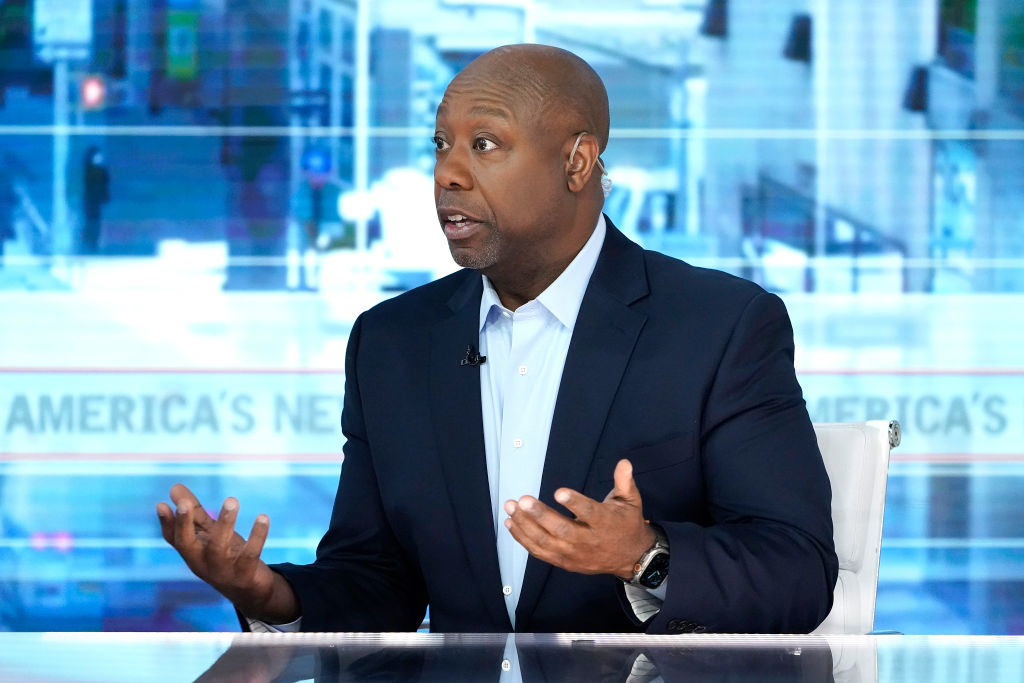On Tuesday morning the New York Times alerted readers to a notable development in the Republican presidential primary. “Nikki Haley and Tim Scott shift their tone, showing a new openness to criticizing Trump,” the paper reported.
Four days after the frontrunner was indicted by the Justice Department on 37 felony charges, it counts as major news that two challengers are willing to express mild, qualified disapproval of his conduct.
And that’s more than one can say for the leading contender. Ron DeSantis’ deepest thought about the indictment so far has been to complain that he would have been punished severely as a congressman if he had mishandled classified information as irresponsibly as … Hillary Clinton did. “Is there a different standard for a Democratic secretary of state versus a former Republican president?” he wondered, riding to the defense of a man who’s been insulting him every day for months and is leading him by 35 points in the polls.
Semafor reporter Benjy Sarlin captured the vibe.
This is not the stuff of which momentous electoral comebacks are made. In particular, if you believe Republican voters crave demonstrations of dominance by their candidates, the worst thing DeSantis could do is behave like a Trump simp voicing indignation on his opponent’s behalf while Trump goes about calling him an overhyped charisma-less pervert.
Having said that, I recognize there are no good options for Trump’s opponents. If they attack him forthrightly on the documents scandal, they risk making enemies of millions of Trump fans. If they say nothing, they’ve passed on their big chance to try to shape Republican opinion and turn voters against him.
So some have chosen to split the difference. They’re going to criticize him just enough, it seems, to fail to move persuadable Republicans while alienating diehard Trump fanatics in the process.
Why bother?
What’s the scenario in which being only “a little bit pregnant” with criticism of him for concealing classified material erases a 35-point deficit?
Reaction to the indictment within the GOP can be organized into three groups.
The first is the “nothing to gain, everything to lose” cohort of current Republican officeholders in safe seats. Siding with the DOJ against Trump would lose them many more votes than it would gain them in their next election so they’ve gone neck-deep into the tank for their party’s leader.
Kevin McCarthy is a member of this group, naturally.
So is Marco Rubio, who was first elected to the Senate when Florida was a swing state and who lately has found himself winning reelection by a 16-point margin. National security has always been Rubio’s passion and pet issue; here’s how seriously he takes the subject when it butts up against Donald Trump’s political ambitions.
When he was asked during an interview about Trump’s habit of leaving sensitive natsec material lying around Mar-a-Lago, he couldn’t figure out what the fuss was about. “There’s no allegation that he sold it to a foreign power or that it was trafficked to somebody else or that anybody got access to it,” Rubio told CBS. In 2016, when the extent of Hillary Clinton’s considerable yet lesser recklessness in mishandling classified information went public, his tone was … different.
Nothing to gain, everything to lose.
The closest thing to a surprise in this group has been Lindsey Graham, a man second to none in his obsequiousness toward Trump who also happens to be the most stalwart hawk in all of Congress. Graham has tried hard to suppress his innate disgust at Trump for having jeopardized national security but he hasn’t quite extinguished it entirely. “Did he do things wrong? Yes, he may have,” he conceded in an interview with ABC News amid spinning to minimize the gravity of the charges. “I’m not saying it’s OK.”
Reserving judgment on whether it’s “okay” to steal top-secret documents and then do next to nothing to secure them inside a sprawling, publicly accessible venue is the best we’re going to get from the “nothing to gain” group.
Next comes the “nothing to lose, everything to gain” cohort. These are Republicans who, for different reasons, face no meaningful consequences for criticizing Trump on how he handled classified material. Either they’ve already alienated most GOP voters irreparably or their conscience matters more to them than political power does—or both. It’s because these guys have chosen their conscience over Trump’s interests in the past that Republican voters came to hate them to begin with, after all.
Asa Hutchinson is in this group. So is this guy, a very late latecomer to the “conscience over Trump” faction:
Mitt Romney, on the other hand, has been part of that faction for years:
After twice voting to remove Trump from office, he’s at peace with building his legacy as a conscientious statesman and letting the electoral chips fall where they may. Christie and Hutchinson, meanwhile, are playing with house money in the presidential primary: Because they stand no chance of winning, they’re free to make their mark by telling uncomfortable truths about the frontrunner that less scrupulous candidates won’t go near. Christie leaned into that image in his CNN town hall on Monday night:
He’s sitting at somewhere between zero and 1 percent in polling. He won’t fall any further if he lets it all hang out in attacking Trump and could conceivably start to climb if anti-Trump voters backing other candidates take a shine to his bravado. Nothing to lose, everything to gain.
Which brings us to the third group, the “little bit pregnant” cohort.
Some Republicans have something to lose and something to gain potentially by going on offense over the Trump indictment. If you’re a presidential candidate polling in the low single digits but (unlike Christie) otherwise remain in reasonably good standing with the base, how should you play it?
Do you want to ignore the indictment or even come to Trump’s defense on it? Theoretically, Republican voters could be convinced that what Trump did was inexcusable and disqualifying if enough influential figures in the party were to unite around that message. The more who refuse, the more room there is for the GOP base to doubt that what he did was truly problematic. By declining to attack him, you’re giving primary voters “permission” to side with him and paving his way to a third nomination.
But by staying on his good side, you’re also preserving your chances of being chosen as his running mate or succeeding him as nominee in 2028.
Or do you want to go all-in and try to win by attacking Trump aggressively on the allegations in the indictment? If the critique works and Republican opinion begins to turn against him, you’ll be a bona fide hero for having helped move the party away from a lawless sociopath. And once his polling begins to drop, the nomination will be up for grabs. You could become the next president.
But, Republican voters being what they are, it’s waaaay more likely that you’ll end up despised by the base and forced to golf-clap at the convention after Trump shakes off your criticism and cruises to the nomination regardless.
Which path do you take?
Nikki Haley can’t decide so she’s going to try to take both. Trump did a terrible thing, she concedes, but the Justice Department is also terrible.
If the DOJ and FBI have lost all credibility with the American people, why should anyone care what the indictment alleges? Those allegations aren’t credible, by definition.
Tim Scott went a similar route. The indictment presents a “serious case with serious allegations,” he allowed, but whether the Justice Department should be taken seriously is another matter:
“As Americans, we have to have a justice system where the lady of justice wears a blindfold,” Scott told reporters following his Spartanburg appearance, where he rolled out a list of endorsements by South Carolina politicians.
“What we see today across this administration of President Joe Biden is a double standard,” he said. “That double standard is both un-American and unacceptable. You can’t protect Democrats while targeting and hunting Republicans.”
That’s more coherent than Haley’s argument, as one can believe that the DOJ has been unfairly lenient toward Democrats while being appropriately skeptical of Trump. But here too we find a candidate trying to be a little bit pregnant by redirecting Republican outrage away from the frontrunner and toward a traditional enemy. If Biden’s Justice Department is practicing an unfair double standard, wouldn’t it be wrong for Republican voters to validate that unfairness by denying Trump his party’s nomination because of it?
Aaron Blake of the Washington Post described Haley’s and Scott’s comments about the indictment as “trial balloons,” which I think is right. But what’s the “trial”? What are they trying to accomplish, precisely?
Is the idea that a bit of very mild criticism heavily diluted by complaints about the Justice Department will knock 20 points off Trump’s polling? I can’t believe they believe that.
Unless this is a prelude to them going full metal Christie in trying to make Trump’s classified-documents scandal a major liability in the primary, what’s the point?
I don’t think there is any point or strategy here per se, only a desperate belief by Haley and Scott that there’s some hypothetical “sweet spot” in the primary with regard to criticizing Trump. With just the right tone and just the right number of caveats and just the right amount of discretion in deciding whether to mention him by name, it may be possible to attack him in a way that’s persuasive to most Republican voters yet inoffensive to him and his MAGA stalwarts.
“What he did was reckless, but something something Justice Department” sounds like an early stab at groping one’s way to that sweet spot. It’s tantamount to “dialing in” on the target when firing mortars: If Trump’s polling dips next week, Haley and Scott might lean a little more heavily on the “reckless” part and less heavily on the “corrupt DOJ” part the next time they talk about this.
The thing is, I don’t think there is any sweet spot.
Anti-Trumpers cling to the myth that there might be one because doing so staves off defeatism and paralysis. If there’s no plausible way to thread the needle between attacking Trump too much and not enough, or at least not enough of one to build a winning coalition, then all hope is lost. Better to pretend otherwise, keep plugging, and hope for the best.
In reality, it’s DeSantis rather than Haley or Scott who has the most compelling theory of where the sweet spot might lie. “The DeSantis team argues that the swing voters of the Republican primary are on the far-right rather than the center-right and are more focused on cultural than economic power,” Axios reported last week. That’s correct, and that’s why DeSantis has placed himself in the “nothing to gain, everything to lose” camp with respect to criticizing Trump over the indictment. Siding with the DOJ in this matter would gain him nothing with those far-right swing voters and might cost him considerable support. He’ll reserve his attacks on Trump for more base-friendly grievances, like COVID restrictions.
At some point soon, though, the governor may be forced to conclude that the sweet spot doesn’t exist after all. A new Morning Consult poll out on Tuesday finds that Trump’s lead has grown since the federal indictment was announced. He stands at 59 percent now, up 4 points from before the charges were filed, and enjoys a lead of fully 40 points over DeSantis. At 19 percent, the challenger is near his all-time low in that poll.
“But eventually the federal charges will convince Republican voters that Trump is unelectable,” you might say. Right, conceivably—it’s a big part of DeSantis’ case against nominating him. But here’s another new poll, in this case from CBS:
Post-indictment, more Republicans think Trump would “definitely” beat Biden than think DeSantis would. If those numbers don’t start moving, what’s left of his theory about the sweet spot?
There’s an alternative approach that he and the rest of the field could take. Instead of the candidates trying to feel their way toward some perfectly finessed line of attack that will somehow ruin Trump without alienating his core voters, they could join hands and begin attacking him full-bore on the federal charges, as Christie and Hutchinson have. Call it the “full-court press” approach to taking out Trump.
If the entire Republican field spoke with one voice about his fitness and electability—“he can’t be trusted with national secrets and he has no chance of winning another national election”—could the raw Avengers-style force-multiplier effect of that message begin to move the polling against Thanos?
I’m thinking … a little? Maybe?
But not much. The problem, as is usually true in conservative politics, is conservative media. If DeSantis, Haley, Scott, and the rest joined forces to try to create a “permission structure” for Republican voters to conclude that the Orange Man really is bad, populist media gatekeepers would suppress it and counterprogram it with pushback from trusted MAGA figures.
For a true full-court press against Trump, you’d need people like Kari Lake, Marjorie Taylor Greene, Matt Gaetz, Steve Bannon, Mark Levin, The Daily Wire, etc., to join the “Orange Man bad” campaign, which will never happen. Some are Trump true believers, others are grifters whose wealth and power depend on the patronage of true believers, but either way there would be plenty of institutional populist media support available on Trump’s behalf to dismantle the scaffolding of the permission structure before it’s built. When the dust cleared, Republican voters wouldn’t come away believing that the Orange Man is bad; they’d come away believing that the governor of Florida is bad for having endorsed the DOJ’s view of the Orange Man’s badness.
Even conservative media figures who quietly hope to see Trump ruined by his legal saga so that the party can finally move on wouldn’t join the full-court press. That’s the lesson of Fox News’ Dominion saga. So long as there’s a competitor out there willing to behave less ethically than you in feeding propaganda to the right—and there always is—your choice is to either sink to their level to keep pace or watch them cannibalize your audience. An audience confronted with a determined argument that the Orange Man is bad would simply switch to one of the many alternative outlets assuring them that, actually, the Orange Man is the lamb of God.
Because the collective action problem can’t be solved, the full-court press would be broken easily. To believe otherwise, that there’s some nucleus of influential right-wingers out there who might brute-force a sea change in opinion about Trump by hammering him in unison over the indictment, is to succumb to denial about what the right has become. An Avengers-style group attack is worth trying just because every tactic is worth trying on “leave it all on the field” grounds, but there’s no reason to think it would work. The frightening reality is that the tiger is loose. Nikki Haley and Tim Scott aren’t going to wrestle it back into its cage.
The best we can hope for is that DeSantis’ tireless campaign of vice-signaling to the right-wing base somehow ends up convincing a critical mass that he, not Trump, is the most illiberal candidate on the menu. Being more than a little pregnant with right-wing culture-war initiatives is a smart primary strategy, if still unlikely to succeed. As a general-election strategy, though: Look out.








